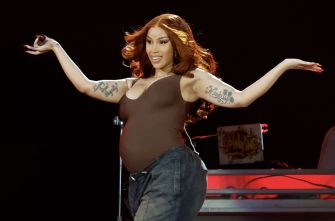When Cardi B confirmed her pregnancy during a September 17, 2025 interview with Gayle King, the Grammy-winning rapper emphasized her joy and strength. She revealed that she was expecting her fourth child with boyfriend and New England Patriots wide receiver Stefon Diggs, saying, “I feel very strong and powerful that I’m doing all of this work while creating a baby.” She added that the child will be born before her next tour and defended her decision to keep the pregnancy private until she felt ready to share it. “Can I just say it on my own time, my own terms?” she asked.
But almost immediately, Cardi’s announcement ignited a wave of criticism online. Detractors accused her of irresponsibility, pointing to her ongoing divorce from fellow rapper Offset, her still-legal husband and father of her first two children. Some framed her decision to expand her family as evidence of a “broken home,” comparing her to Nick Cannon, who has fathered 12 children with multiple women. One of the most cutting responses came from Crissle West, co-host of the podcast The Read. West suggested Cardi was being reckless: “Giving her pussy to whoever the fuck she wants to and keeping whatever y’all drop off in her uterus is crazy.”
The commentary reflects a much older cultural script. For decades, politicians and commentators have argued that single-parent households in Black communities are the root cause of social ills like poverty and gun violence. Conservative commentator Charlie Kirk reiterated this in a 2024 debate, claiming “rap culture” glorifies absentee fathers and pointing to Cardi B and Nicki Minaj as examples of negative influence. This echoes the language of the 1965 Moynihan Report, which framed Black families as structurally damaged by slavery and suggested that fatherless households were responsible for Black poverty.
Yet research consistently shows that the nuclear family model is not the sole determinant of child well-being. Christina Cross, a Harvard sociologist who has extensively studied Black family structures, has found that children in single-parent Black households often experience less disadvantage than white children in similar circumstances because of extended kinship networks. Black children are more likely to be raised with support from grandparents, stepparents, and community figures. “A lot of these conversations about Cardi B and her new child are rooted in culture and politics, but not in fact,” Cross told Rolling Stone.
Cross’s book Inherited Inequality underscores the limits of family structure as a predictor of success. While Black children in two-parent households generally fare better than those in single-parent homes, the gap is modest, and both groups continue to lag behind white families because of structural racism. “Black two-parent families are still at higher risk of poverty because of unequal economic opportunity,” Cross said. “The gap is systemic.”
Meanwhile, Black nuclear families are on the rise. Studies show a 15 percent increase in two-parent Black households over the last decade. Still, federal and state policies often reinforce outdated notions about family life. Programs like Temporary Assistance for Needy Families (TANF) allocate significant funds toward marriage promotion initiatives instead of directly supporting struggling households. Cross argues that if funding kept pace with inflation, or expanded as it did during the 2021 child tax credit, millions of children could be lifted out of poverty.
Cardi B’s situation complicates the narrative. With a net worth estimated near $100 million, her economic circumstances distinguish her from most single or separated mothers. She has spoken openly about the role of her extended family, describing how her New Jersey home often housed multiple relatives who helped care for her children while she worked. This mirrors what researchers highlight as a strength of Black family life: communal support.
Yet critics focus less on her wealth or family network and more on the fact that her marriage ended publicly. Deja Logan, an analyst at Child Trends, argues that children’s outcomes are tied more closely to access to quality schools, safe neighborhoods, and supportive caregivers than to whether both biological parents live under one roof. “Kids thrive when they have stability and resources,” Logan explained.
Legal experts note that public perceptions of family structure can have real-world consequences. Diana Adams, a New York attorney who specializes in non-traditional family law, said that custody and divorce rulings can vary widely depending on geography and a judge’s outlook. “Too often it’s a subjective decision,” Adams said, pointing out that conservative courts may penalize women in non-nuclear family arrangements.
Despite her wealth and fame, Cardi B faces scrutiny shaped by long-standing racial and gendered stereotypes. Labels like “ghetto” and “broken home” recycle the language once used to pathologize Black families in the mid-20th century. As Cross and other scholars emphasize, these critiques often ignore the broader forces that shape the lives of Black parents and children.
Cardi B’s pregnancy has become a flashpoint in a much larger debate: who gets to define what a “real family” looks like. While her critics reduce her choices to caricatures, the backlash reveals how deeply entrenched ideas about race, respectability, and motherhood remain in American culture.






